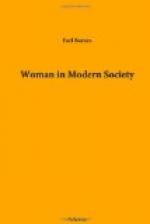The claims advanced in opposition to the higher education of women have largely broken down to-day. It was long maintained that her mind was inferior to man’s mind in kind and quality, and that she could not do the work required. In the presence of thousands of young women carrying all kinds of university work with credit and honor such charges become absurd. The belief that woman’s health could not stand the strain fails for the same reason. The fear that she would be less likely to marry; or marrying, would be less likely to have children, has been seen to have some body of fact behind it; but we have seen also that university students are recruited from groups that are not the most fecund, and that the same danger applies to men students as to women.[25] Women in higher education are now accepted as a regular part of our modern life.
[25] Eight hundred and eighty-one Harvard graduates, twenty-five years after graduation, had but 1,226 children. If half were boys, we have but 613 sons for 881 Harvard graduates. HUGO MUeNSTERBERG, The Americans, p. 582. Boston: Houghton, Mifflin & Co., 1901.
And yet there is one objection that still remains unanswered in very many minds. It has always been feared that women would lower the standard of scholarship; and there is much in the quality of the present generation of women students that may strengthen this belief. In the seventies and eighties, the fear of being thought peculiar still kept many ordinary women away from colleges. Now it has become fashionable, and a woman who has been to college stands better in a community than one who has not. Add to this the freedom and romance of “going to college” and it follows that many young women, with increasing economic freedom, are tempted to go up to the universities just as well-placed young Englishmen go to Cambridge or Oxford as passmen. They have no special interest in scholarship; but they like the life. This large body of young women, and of men under similar conditions, will doubtless lower the scholarship of modern college and university life as a whole. But possibly the need of the world for all-around men and women is even greater than its need for scholars; and in that case we may find justification for both passmen and passwomen.
With the opening of knowledge to women it became possible for them to instruct children in matters intellectual; and since our school learning was almost entirely a matter of information and mental training, they early became an important part of the teaching profession in America.
Once started, all our conditions favored the rapid increase of women teachers. There were industrial openings for men on every side; and with our rapid increase in population, an army of teachers was required. Since the calling had in the past been filled by inferior members of the clergy, broken-down soldiers, or old women, there was a tradition of constant change, and young men on their way to permanent professions were steadily supplanted by young women on their way to the altar.




